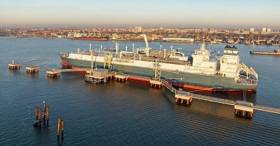Displaying items by tag: Imports
The Central Statistics Office (CSO) has said imports from Britain fell by almost two thirds in January after the UK left the European Union.
The latest trade statistics from the CSO reveal an immediate Brexit impact with the value of imports falling by 65 per cent - from €1.4 billion to €497 million - in January compared to the same month last year.
The fall-off was driven by declines in imports of food and live animals (-75 per cent) and mineral fuels (-71 per cent).
The CSO said a combination of factors contributed to the large reduction in imports from the Britain in January, including the challenges of complying with customs requirements.
Other factors included the stockpiling of goods in the final quarter of 2020 in preparation for Brexit, the substitution with goods from other countries, and a reduction in trade volumes due to the impact of Covid-19.
For more including on exports, reports The Irish Times here.
Fracked Gas: Petition Against Plans to Import from US to Cork Harbour
A plan to store fracked gas in Cork could be illegal a Cork TD has claimed.
It comes as more than 2,000 signatures writes EchoLive.ie, have been gathered on an online petition opposing the potential Cork Liquified Natural Gas (LNG) terminal.
If it goes ahead, fracked gas from the United States would be imported into Cork harbour.
In 2017 a Memorandum of Understanding was signed by the Port of Cork with US company NextDecade as Afloat previously reported..
It could see an LNG terminal built, using a floating storage and regasification unit.
An online petition was created by the group ‘Not Here Not Anywhere’ who are a grassroots campaign against drilling for oil and gas off the Irish coasts and the development of any new fossil fuel infrastructure in Ireland.
For more click here
#NewsUpdate - A delivery of the first imported animal feed in response to the deepening - and now nationwide - fodder crisis has arrived in Rosslare Harbour.
The feed reports RTE News, which has been imported from Britain, will then be distributed by Dairygold Co-Op to ten locations around Munster.
Further significant imports are scheduled for the coming days, with Glanbia and Lakeland Dairies saying that they have also sourced animal feed abroad for their members.
The Dairygold Co-Op executives who sourced and organised the first 2,500 tonnes of animal feed in response to the deepening weather-related shortage are attempting to locate even more supplies to distribute to their farmer members.
Seamus O'Mahoney, Head of Sales at Dairygold Argi Business, said around 3,500 bales are expected to arrive at Rosslare Port over the next two to three days.
Speaking on RTÉ's Morning Ireland, he said imports from the UK were inevitable given the current situation facing farmers.
"We have been seeing over the last few months that farmers have been trying to stretch existing fodder and we have had a very long winter, two storms, a late spring. Farmers didn’t have a chance to put out fertiliser and all of those factors didn’t click," he said.
Click HERE for more on the farming crisis.

























































